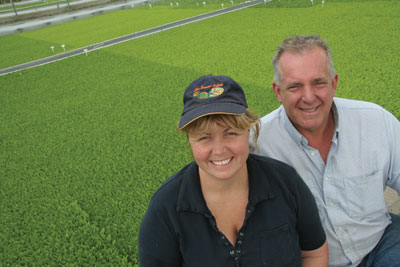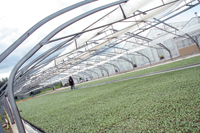
In Sylvain Lefort’s office, a window allows a peek into the heart of
his business: what you see are tiny broccoli seedlings growing in a
state-of-the-art greenhouse, complete with auto-mated watering and
climate control.
 |
| Marie-Josée Lebire and husband Syvlain Lefort employ about 40 workers. (Photos by André Dumont) |
In Sylvain Lefort’s office, a window allows a peek into the heart of his business: what you see are tiny broccoli seedlings growing in a state-of-the-art greenhouse, complete with auto-mated watering and climate control.
The peace and quiet offered by Lefort’s office window view can be a little misleading. A few steps outside, the site of Quebec’s busiest vegetable seedling producer is bustling. Mature transplants are being moved around. New greenhouses are going up while others are being modified or modernized.
Lefort and wife Marie-Josée Lebire’s bread and butter is all about starting vegetables for other farmers. Located in Sainte-Clothilde-de-Châteauguay, south of Montreal, Les Serres Lefort has been in business for 26 years. Over the last 10 years, production has expanded more than five-fold.
“I’m at the base of other farmers’ livelihood,” Lefort says. “I can’t afford to make mistakes.”
Silver Medallists In 2010 Provincial Farming Program
Last September, Lefort and Lebire won the silver medal in Quebec’s most prestigious farming awards program – the 121th edition of l’Ordre national du mérite agricole. Participants must prepare a comprehensive application about their farm. Finalists are audited and rated on production, environment, finances, human resources and community involvement.
Les Serres Lefort has four hectares of greenhouses. Vegetable seedlings are grown for both field and greenhouse crops.
Lefort’s reputation for reliability and quality is what has made expansion possible. It is estimated that more than 65 per cent of the province’s vegetable seedlings are produced here. “It’s a huge responsibility,” Lefort says. “We take our work very much to heart.”
Tomato, pepper, cabbage, broccoli, lettuce and other vegetable seedlings are closely monitored by an agronomist and a team of technicians. A full-time computer technician is also part of staff, ensuring automated climate control systems work properly.
It is only after a stay in a transition greenhouse, where they get used to the great outdoors, that field crop seedlings get delivered to the client, on the day and hour requested.
 |
|
| Transplants are hardened off in a transition greenhouse. |
Ensuring Consistent Seedlings Despite Weather, Disease Pressures
Growing transplants is not hard, Lefort says. The challenge is to grow them in ample supply, with consistent quality throughout the season, despite difficult weather conditions or disease pressures.
Over the years, the crop team has amassed considerable knowledge about vegetable varieties, how best to seed them and how to provide optimal service and advice to clients, in order to help them extend their season.
Les Serres Lefort now operates 12 months a year. Adding greenhouse tomato transplants to the lineup has helped make the most of the existing infrastructure, namely by servicing clients who start their tomatoes early in the winter.
What will Les Serres Lefort look like in a few years? “You just have to visit European producers and you’ll get a pretty good idea,” Lefort says.
In Europe, high labour costs have pushed the industry into greater automation that goes beyond irrigation, fertilization and ventilation controls. Seedling producers seldom use manual labour to handle cell trays.
Access to workers from Latin America makes it possible for Lefort to invest a little less in automation and a lot more in expansion. His company has recently started growing hydroponic Boston lettuce on contract for a major Quebec-based lettuce grower.
Quebec Production Has Reached A Plateau
The growth of Les Serres Lefort has always been in concert with Quebec’s vegetable industry. There have been several years of steady, strong growth in the province, Lefort says. Now it seems that overall production has reached a plateau, with only a few large growers still expanding production.
The number of produce farms in Quebec has shrunk considerably, leaving a smaller number of larger farms in business. Lefort believes total acreage for produce has remained the same, with the difference being that large growers mostly all use transplants.
Those that remain in business have no choice but to use the best agronomical practices, along with quality seedlings, Lefort says. In the highly competitive and volatile fresh produce market, growers “make huge investments and they can’t afford to make mistakes.”
Despite the colder weather, Quebec produce farmers are capable of competing with imports, Lefort says. “We grow very nice quality produce. We could take a bigger share of our local market. Consumers could be buying a lot more local produce.”
André Dumont is a freelance writer and photographer in Quebec.
| Q and A We also posed questions to co-owner Marie-Josée Lebire during our visit. Question: What makes your business successful? Answer: Our teamwork. Our employees are passionate about their work, just like it was their own business. Question: What is your biggest everyday challenge? Answer: To have impeccable quality, year after year, despite weather and diseases. Question: What makes a great business manager? Answer: You need to know how to listen to employees, clients and … plants! Question: What makes a bad business manager? Answer: Losing track of production costs, goals and employee well-being while managing fast-pace growth. |
Print this page